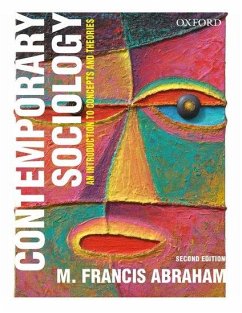28,99 €
inkl. MwSt.
Versandfertig in über 4 Wochen

14 °P sammeln
- Broschiertes Buch
- Merkliste
- Auf die Merkliste
- Bewerten Bewerten
- Teilen
- Produkt teilen
- Produkterinnerung
- Produkterinnerung
Contemporary Sociology is comprehensive, interdisciplinary, comparative, and current. Using his rich experience as teacher and writer of textbooks, M. Francis Abraham presents a modern text that goes beyond conventional themes and geographic boundaries to include theoretical perspectives and research methods, key concepts and theories in several branches of the discipline, relevant issues in education, economy, population, stratification, minorities, deviance,urbanization, and environment.
Andere Kunden interessierten sich auch für
![Classical and Contemporary Sociological Theory Classical and Contemporary Sociological Theory]() Scott AppelrouthClassical and Contemporary Sociological Theory239,99 €
Scott AppelrouthClassical and Contemporary Sociological Theory239,99 €![The Purchase of Intimacy The Purchase of Intimacy]() Viviana A ZelizerThe Purchase of Intimacy40,99 €
Viviana A ZelizerThe Purchase of Intimacy40,99 €![Mainstream and Critical Social Theory Mainstream and Critical Social Theory]() Jeffrey A. Alexander / Jeffrey C Alexander (eds.)Mainstream and Critical Social Theory1.232,99 €
Jeffrey A. Alexander / Jeffrey C Alexander (eds.)Mainstream and Critical Social Theory1.232,99 €![Gig Gig]() Gig22,99 €
Gig22,99 €![Facing Modernity Facing Modernity]() Barry SmartFacing Modernity69,99 €
Barry SmartFacing Modernity69,99 €![Classical Sociological Theory, 3e & Contemporary Sociological Theory, 3e Set Classical Sociological Theory, 3e & Contemporary Sociological Theory, 3e Set]() Classical Sociological Theory, 3e & Contemporary Sociological Theory, 3e Set101,99 €
Classical Sociological Theory, 3e & Contemporary Sociological Theory, 3e Set101,99 €![Converging Divergences Converging Divergences]() Harry C KatzConverging Divergences28,99 €
Harry C KatzConverging Divergences28,99 €-
-
-
Contemporary Sociology is comprehensive, interdisciplinary, comparative, and current. Using his rich experience as teacher and writer of textbooks, M. Francis Abraham presents a modern text that goes beyond conventional themes and geographic boundaries to include theoretical perspectives and research methods, key concepts and theories in several branches of the discipline, relevant issues in education, economy, population, stratification, minorities, deviance,urbanization, and environment.
Hinweis: Dieser Artikel kann nur an eine deutsche Lieferadresse ausgeliefert werden.
Hinweis: Dieser Artikel kann nur an eine deutsche Lieferadresse ausgeliefert werden.
Produktdetails
- Produktdetails
- Verlag: Oxford University Press
- 2nd Revised edition
- Seitenzahl: 348
- Erscheinungstermin: 25. Februar 2015
- Englisch
- Abmessung: 240mm x 184mm x 20mm
- Gewicht: 490g
- ISBN-13: 9780199452781
- ISBN-10: 0199452784
- Artikelnr.: 54542796
- Herstellerkennzeichnung
- Libri GmbH
- Europaallee 1
- 36244 Bad Hersfeld
- gpsr@libri.de
- Verlag: Oxford University Press
- 2nd Revised edition
- Seitenzahl: 348
- Erscheinungstermin: 25. Februar 2015
- Englisch
- Abmessung: 240mm x 184mm x 20mm
- Gewicht: 490g
- ISBN-13: 9780199452781
- ISBN-10: 0199452784
- Artikelnr.: 54542796
- Herstellerkennzeichnung
- Libri GmbH
- Europaallee 1
- 36244 Bad Hersfeld
- gpsr@libri.de
M. Francis Abraham has taught in India and the United States for over thirty years and is President of American International University Foundation, USA. He has authored, co-authored, and edited 13 books including the seminal Modern Sociological Theory (1983).
List of Tables and Figures
Acknowledgements
Note for Teachers and Students
I THE FIELD OF SOCIOLOGY
1 DEFINING SOCIOLOGY
What is Sociology?
Sociology and Other Social Sciences
The Sociological Perspective
The Founding Fathers of Sociology
Auguste Comte
Karl Marx
Herbert Spencer
Émile Durkheim
Max Weber
Contemporary Sociology
2 THEORETICAL PERSPECTIVES IN SOCIOLOGY
What is Sociological Theory?
Types of Sociological Theory
Speculative Theories vs. Grounded Theories
Grand Theories vs. Miniature Theories
Macro Theories vs. Micro Theories
Functions of Sociological Theory
Mainline Theories in Sociology
Evolutionary Theory
Structural-functionalism
Conflict Theory
The Frankfurt School and Critical Theory
Symbolic Interactionism
Exchange Theory
Choosing and Using Sociological Theory
Theoretical Perspectives in a Global Age
3 METHODS OF RESEARCH IN SOCIOLOGY
The Scientific Approach
Basic Principles
Steps in the Research Process
Selection of the Topic
Review of Literature
Formulation of Hypotheses
Selection of Research Design
Collection of Data
Analysis of Data
Writing the Report and Sharing the Results
Methods of Research
Surveys
Experiments
Observational Studies: Participant and Non-participant Observation
Analysis of Secondary Data
Quantitative Vs. Qualitative Research
Issues in Sociological Research
II THE FOUNDATIONS OF SOCIETY
4 CULTURE
The Meaning of Culture
Components of Culture
Beliefs
Values
Language
Norms
Technology
Cultural Orientation
Cultural Diversity
Cultural Change
Towards a Global Culture?
5 SOCIALIZATION
Heredity and Environment
The Results of Deprived Socialization
Theories of Socialization
Sociological Theories
Psychological Theories
Agents of Socialization
The Family
Peer Groups
The School
Mass Media
Adult Socialization
Resocialization
Total Institutions
Socialization by Caste, Religion, and Gender
6 SOCIAL INTERACTION
Verbal and Non-verbal Communication
Crystallization of Social Action
Nature of Social Interaction
Theories of Social Interaction
Dramaturgical Approach
Ethnomethodology
The Structure of Social Interaction
Status
Role
Forms of Social Interaction
Cooperation
Competition
Conflict
Accommodation
Exchange
Virtual Networking
7 TYPES OF SOCIETIES AND GROUPS
Evolution of Societies
Hunting and Gathering Societies
Horticultural Societies
Pastoral Societies
Agrarian Societies
Industrial and Post-industrial Societies
Three Typologies
Mechanical and Organic Solidarity: Émile Durkheim
Gemeinschaft and Gesellschaft: Ferdinand Tonnies
Folk and Urban Societies: Robert Redfield
Types of Social Groups
Aggregate
Societal Group
Social Group
Associational Group
Primary and Secondary Groups
In-groups and Out-groups
Reference Groups
Electronic Communities
Formal Organizations and Bureaucracy
Size and Group Dynamics
Social Organization
8 DEVIANCE AND SOCIAL CONTROL
What is Deviance?
The Normality of Crime: Durkheim
Consequences of Deviance
Theories of Deviant Behaviour
Biological Theories
Psychological Theories
Sociological Theories
Anomie Theory
Differential Association Theory
Labelling Theory
Conflict Theory
Gender and Deviance
Crime and Criminals
Social Control
Informal Social Control
Formal Social Control
III SOCIAL INEQUALITY
9 SOCIAL STRATIFICATION
Three Systems of Stratification
The Estate System
The Caste System
The Class System
Race, Gender, and Stratification
Dimensions of Social Stratification
Theories of Stratification
Functional Theory
Conflict theory
Global Systems of Stratification
Caste and Class in India
Lifestyles and Life-chances
Social Mobility
10 MINORITIES AND WEAKER SECTIONS
Prejudice and Discrimination
Patterns of Majority-Minority Relations
Minority Responses
Minority Groups in India
Persons with Disabilities
The Aged
Women as a Minority
Women in India
Dalits and Other Backward Classes (OBCs)
Tribes in India
Minority by Sexual Orientation
IV SOCIAL INSTITUTIONS
11 THE FAMILY
Types of Families
Marriage Patterns
Functions of the Family
The Future of Marriage and Family
Marriage and Family in India
Global Trends in Marriage and Family
Domestic Violence
12 THE POLITICAL ECONOMY
State and Government
Functions of the State
Social Control
Defence
Welfare
Types of States
Autocracy
Totalitarianism
Democracy
Types of Economy
Capitalism
Socialism
Mixed Economy
Democratic Socialism
Power and Authority
Theories of Power in Societies
The Power Elite Model
The Pluralist Model
The Indian Political Scene
Globalization and Corporate Capitalism
13 EDUCATIONAL SYSTEM
Functions of Education
Socialization
Cultural Transmission
Social Placement
Innovation
Social Integration
Critical Thinking
Inequality in Education
Education and the UN Millennium Development Goals
Education in India
14 RELIGION
Religions among the 'Primitive' People
Elements of Religion
Some Related Concepts
Magic
Sect
Cult
Contemporary Sociological Perspectives on Religion
Key Sociological Theories on Religion
The Functionalist Perspective
The Conflict Perspective
Durkheim's Theory of Religion
Recent Trends in Religion
Secularization
Resacralization
Fundamentalism
Religion in India
V SOCIAL CHANGE
15 POPULATION AND URBANIZATION
The Basic Concepts
Fertility
Mortality
Migration
Theoretical Perspectives
Malthusian Theory of Population
Demographic Transition Theory
Population Explosion: Causes and Consequences
A Note on Population in India
Urbanization
Theoretical Perspectives
Georg Simmel: Metropolis and Mental Life
Louis Wirth: Urbanism as a Way of Life
Urbanization in India
16 COLLECTIVE BEHAVIOUR AND SOCIAL MOVEMENTS
Theories of Collective Behaviour
Contagion Theory
Emergent Norm Theory
Convergence Theory
Value-added Theory
Forms of Collective Behaviour
Crowds
Dispersed Collective Behaviour
Rumour
Fads and Fashions
Social Movements
Theories of Social Movements
Relative Deprivation Theory
Resource Mobilization Theory
Political Opportunity/Political Process Theory
New Social Movements
The Life-cycle of Social Movements
Social Movements in India
Environmental Movements
Women's Movements
Caste-oriented Movements
17 SOCIAL CHANGE, ENVIRONMENT, AND SUSTAINABLE DEVELOPMENT
Theories of Social Change
Evolutionary Theory
Functional Theory
Conflict Theory
Sources of Social Change
Physical Environment
Technology
Cultural Contacts and Diffusion
Values and Ideology
The Process of Social Change
Social Change in India
Environment
Sustainable Development
Further Readings
Index
About the Author
Acknowledgements
Note for Teachers and Students
I THE FIELD OF SOCIOLOGY
1 DEFINING SOCIOLOGY
What is Sociology?
Sociology and Other Social Sciences
The Sociological Perspective
The Founding Fathers of Sociology
Auguste Comte
Karl Marx
Herbert Spencer
Émile Durkheim
Max Weber
Contemporary Sociology
2 THEORETICAL PERSPECTIVES IN SOCIOLOGY
What is Sociological Theory?
Types of Sociological Theory
Speculative Theories vs. Grounded Theories
Grand Theories vs. Miniature Theories
Macro Theories vs. Micro Theories
Functions of Sociological Theory
Mainline Theories in Sociology
Evolutionary Theory
Structural-functionalism
Conflict Theory
The Frankfurt School and Critical Theory
Symbolic Interactionism
Exchange Theory
Choosing and Using Sociological Theory
Theoretical Perspectives in a Global Age
3 METHODS OF RESEARCH IN SOCIOLOGY
The Scientific Approach
Basic Principles
Steps in the Research Process
Selection of the Topic
Review of Literature
Formulation of Hypotheses
Selection of Research Design
Collection of Data
Analysis of Data
Writing the Report and Sharing the Results
Methods of Research
Surveys
Experiments
Observational Studies: Participant and Non-participant Observation
Analysis of Secondary Data
Quantitative Vs. Qualitative Research
Issues in Sociological Research
II THE FOUNDATIONS OF SOCIETY
4 CULTURE
The Meaning of Culture
Components of Culture
Beliefs
Values
Language
Norms
Technology
Cultural Orientation
Cultural Diversity
Cultural Change
Towards a Global Culture?
5 SOCIALIZATION
Heredity and Environment
The Results of Deprived Socialization
Theories of Socialization
Sociological Theories
Psychological Theories
Agents of Socialization
The Family
Peer Groups
The School
Mass Media
Adult Socialization
Resocialization
Total Institutions
Socialization by Caste, Religion, and Gender
6 SOCIAL INTERACTION
Verbal and Non-verbal Communication
Crystallization of Social Action
Nature of Social Interaction
Theories of Social Interaction
Dramaturgical Approach
Ethnomethodology
The Structure of Social Interaction
Status
Role
Forms of Social Interaction
Cooperation
Competition
Conflict
Accommodation
Exchange
Virtual Networking
7 TYPES OF SOCIETIES AND GROUPS
Evolution of Societies
Hunting and Gathering Societies
Horticultural Societies
Pastoral Societies
Agrarian Societies
Industrial and Post-industrial Societies
Three Typologies
Mechanical and Organic Solidarity: Émile Durkheim
Gemeinschaft and Gesellschaft: Ferdinand Tonnies
Folk and Urban Societies: Robert Redfield
Types of Social Groups
Aggregate
Societal Group
Social Group
Associational Group
Primary and Secondary Groups
In-groups and Out-groups
Reference Groups
Electronic Communities
Formal Organizations and Bureaucracy
Size and Group Dynamics
Social Organization
8 DEVIANCE AND SOCIAL CONTROL
What is Deviance?
The Normality of Crime: Durkheim
Consequences of Deviance
Theories of Deviant Behaviour
Biological Theories
Psychological Theories
Sociological Theories
Anomie Theory
Differential Association Theory
Labelling Theory
Conflict Theory
Gender and Deviance
Crime and Criminals
Social Control
Informal Social Control
Formal Social Control
III SOCIAL INEQUALITY
9 SOCIAL STRATIFICATION
Three Systems of Stratification
The Estate System
The Caste System
The Class System
Race, Gender, and Stratification
Dimensions of Social Stratification
Theories of Stratification
Functional Theory
Conflict theory
Global Systems of Stratification
Caste and Class in India
Lifestyles and Life-chances
Social Mobility
10 MINORITIES AND WEAKER SECTIONS
Prejudice and Discrimination
Patterns of Majority-Minority Relations
Minority Responses
Minority Groups in India
Persons with Disabilities
The Aged
Women as a Minority
Women in India
Dalits and Other Backward Classes (OBCs)
Tribes in India
Minority by Sexual Orientation
IV SOCIAL INSTITUTIONS
11 THE FAMILY
Types of Families
Marriage Patterns
Functions of the Family
The Future of Marriage and Family
Marriage and Family in India
Global Trends in Marriage and Family
Domestic Violence
12 THE POLITICAL ECONOMY
State and Government
Functions of the State
Social Control
Defence
Welfare
Types of States
Autocracy
Totalitarianism
Democracy
Types of Economy
Capitalism
Socialism
Mixed Economy
Democratic Socialism
Power and Authority
Theories of Power in Societies
The Power Elite Model
The Pluralist Model
The Indian Political Scene
Globalization and Corporate Capitalism
13 EDUCATIONAL SYSTEM
Functions of Education
Socialization
Cultural Transmission
Social Placement
Innovation
Social Integration
Critical Thinking
Inequality in Education
Education and the UN Millennium Development Goals
Education in India
14 RELIGION
Religions among the 'Primitive' People
Elements of Religion
Some Related Concepts
Magic
Sect
Cult
Contemporary Sociological Perspectives on Religion
Key Sociological Theories on Religion
The Functionalist Perspective
The Conflict Perspective
Durkheim's Theory of Religion
Recent Trends in Religion
Secularization
Resacralization
Fundamentalism
Religion in India
V SOCIAL CHANGE
15 POPULATION AND URBANIZATION
The Basic Concepts
Fertility
Mortality
Migration
Theoretical Perspectives
Malthusian Theory of Population
Demographic Transition Theory
Population Explosion: Causes and Consequences
A Note on Population in India
Urbanization
Theoretical Perspectives
Georg Simmel: Metropolis and Mental Life
Louis Wirth: Urbanism as a Way of Life
Urbanization in India
16 COLLECTIVE BEHAVIOUR AND SOCIAL MOVEMENTS
Theories of Collective Behaviour
Contagion Theory
Emergent Norm Theory
Convergence Theory
Value-added Theory
Forms of Collective Behaviour
Crowds
Dispersed Collective Behaviour
Rumour
Fads and Fashions
Social Movements
Theories of Social Movements
Relative Deprivation Theory
Resource Mobilization Theory
Political Opportunity/Political Process Theory
New Social Movements
The Life-cycle of Social Movements
Social Movements in India
Environmental Movements
Women's Movements
Caste-oriented Movements
17 SOCIAL CHANGE, ENVIRONMENT, AND SUSTAINABLE DEVELOPMENT
Theories of Social Change
Evolutionary Theory
Functional Theory
Conflict Theory
Sources of Social Change
Physical Environment
Technology
Cultural Contacts and Diffusion
Values and Ideology
The Process of Social Change
Social Change in India
Environment
Sustainable Development
Further Readings
Index
About the Author
List of Tables and Figures
Acknowledgements
Note for Teachers and Students
I THE FIELD OF SOCIOLOGY
1 DEFINING SOCIOLOGY
What is Sociology?
Sociology and Other Social Sciences
The Sociological Perspective
The Founding Fathers of Sociology
Auguste Comte
Karl Marx
Herbert Spencer
Émile Durkheim
Max Weber
Contemporary Sociology
2 THEORETICAL PERSPECTIVES IN SOCIOLOGY
What is Sociological Theory?
Types of Sociological Theory
Speculative Theories vs. Grounded Theories
Grand Theories vs. Miniature Theories
Macro Theories vs. Micro Theories
Functions of Sociological Theory
Mainline Theories in Sociology
Evolutionary Theory
Structural-functionalism
Conflict Theory
The Frankfurt School and Critical Theory
Symbolic Interactionism
Exchange Theory
Choosing and Using Sociological Theory
Theoretical Perspectives in a Global Age
3 METHODS OF RESEARCH IN SOCIOLOGY
The Scientific Approach
Basic Principles
Steps in the Research Process
Selection of the Topic
Review of Literature
Formulation of Hypotheses
Selection of Research Design
Collection of Data
Analysis of Data
Writing the Report and Sharing the Results
Methods of Research
Surveys
Experiments
Observational Studies: Participant and Non-participant Observation
Analysis of Secondary Data
Quantitative Vs. Qualitative Research
Issues in Sociological Research
II THE FOUNDATIONS OF SOCIETY
4 CULTURE
The Meaning of Culture
Components of Culture
Beliefs
Values
Language
Norms
Technology
Cultural Orientation
Cultural Diversity
Cultural Change
Towards a Global Culture?
5 SOCIALIZATION
Heredity and Environment
The Results of Deprived Socialization
Theories of Socialization
Sociological Theories
Psychological Theories
Agents of Socialization
The Family
Peer Groups
The School
Mass Media
Adult Socialization
Resocialization
Total Institutions
Socialization by Caste, Religion, and Gender
6 SOCIAL INTERACTION
Verbal and Non-verbal Communication
Crystallization of Social Action
Nature of Social Interaction
Theories of Social Interaction
Dramaturgical Approach
Ethnomethodology
The Structure of Social Interaction
Status
Role
Forms of Social Interaction
Cooperation
Competition
Conflict
Accommodation
Exchange
Virtual Networking
7 TYPES OF SOCIETIES AND GROUPS
Evolution of Societies
Hunting and Gathering Societies
Horticultural Societies
Pastoral Societies
Agrarian Societies
Industrial and Post-industrial Societies
Three Typologies
Mechanical and Organic Solidarity: Émile Durkheim
Gemeinschaft and Gesellschaft: Ferdinand Tonnies
Folk and Urban Societies: Robert Redfield
Types of Social Groups
Aggregate
Societal Group
Social Group
Associational Group
Primary and Secondary Groups
In-groups and Out-groups
Reference Groups
Electronic Communities
Formal Organizations and Bureaucracy
Size and Group Dynamics
Social Organization
8 DEVIANCE AND SOCIAL CONTROL
What is Deviance?
The Normality of Crime: Durkheim
Consequences of Deviance
Theories of Deviant Behaviour
Biological Theories
Psychological Theories
Sociological Theories
Anomie Theory
Differential Association Theory
Labelling Theory
Conflict Theory
Gender and Deviance
Crime and Criminals
Social Control
Informal Social Control
Formal Social Control
III SOCIAL INEQUALITY
9 SOCIAL STRATIFICATION
Three Systems of Stratification
The Estate System
The Caste System
The Class System
Race, Gender, and Stratification
Dimensions of Social Stratification
Theories of Stratification
Functional Theory
Conflict theory
Global Systems of Stratification
Caste and Class in India
Lifestyles and Life-chances
Social Mobility
10 MINORITIES AND WEAKER SECTIONS
Prejudice and Discrimination
Patterns of Majority-Minority Relations
Minority Responses
Minority Groups in India
Persons with Disabilities
The Aged
Women as a Minority
Women in India
Dalits and Other Backward Classes (OBCs)
Tribes in India
Minority by Sexual Orientation
IV SOCIAL INSTITUTIONS
11 THE FAMILY
Types of Families
Marriage Patterns
Functions of the Family
The Future of Marriage and Family
Marriage and Family in India
Global Trends in Marriage and Family
Domestic Violence
12 THE POLITICAL ECONOMY
State and Government
Functions of the State
Social Control
Defence
Welfare
Types of States
Autocracy
Totalitarianism
Democracy
Types of Economy
Capitalism
Socialism
Mixed Economy
Democratic Socialism
Power and Authority
Theories of Power in Societies
The Power Elite Model
The Pluralist Model
The Indian Political Scene
Globalization and Corporate Capitalism
13 EDUCATIONAL SYSTEM
Functions of Education
Socialization
Cultural Transmission
Social Placement
Innovation
Social Integration
Critical Thinking
Inequality in Education
Education and the UN Millennium Development Goals
Education in India
14 RELIGION
Religions among the 'Primitive' People
Elements of Religion
Some Related Concepts
Magic
Sect
Cult
Contemporary Sociological Perspectives on Religion
Key Sociological Theories on Religion
The Functionalist Perspective
The Conflict Perspective
Durkheim's Theory of Religion
Recent Trends in Religion
Secularization
Resacralization
Fundamentalism
Religion in India
V SOCIAL CHANGE
15 POPULATION AND URBANIZATION
The Basic Concepts
Fertility
Mortality
Migration
Theoretical Perspectives
Malthusian Theory of Population
Demographic Transition Theory
Population Explosion: Causes and Consequences
A Note on Population in India
Urbanization
Theoretical Perspectives
Georg Simmel: Metropolis and Mental Life
Louis Wirth: Urbanism as a Way of Life
Urbanization in India
16 COLLECTIVE BEHAVIOUR AND SOCIAL MOVEMENTS
Theories of Collective Behaviour
Contagion Theory
Emergent Norm Theory
Convergence Theory
Value-added Theory
Forms of Collective Behaviour
Crowds
Dispersed Collective Behaviour
Rumour
Fads and Fashions
Social Movements
Theories of Social Movements
Relative Deprivation Theory
Resource Mobilization Theory
Political Opportunity/Political Process Theory
New Social Movements
The Life-cycle of Social Movements
Social Movements in India
Environmental Movements
Women's Movements
Caste-oriented Movements
17 SOCIAL CHANGE, ENVIRONMENT, AND SUSTAINABLE DEVELOPMENT
Theories of Social Change
Evolutionary Theory
Functional Theory
Conflict Theory
Sources of Social Change
Physical Environment
Technology
Cultural Contacts and Diffusion
Values and Ideology
The Process of Social Change
Social Change in India
Environment
Sustainable Development
Further Readings
Index
About the Author
Acknowledgements
Note for Teachers and Students
I THE FIELD OF SOCIOLOGY
1 DEFINING SOCIOLOGY
What is Sociology?
Sociology and Other Social Sciences
The Sociological Perspective
The Founding Fathers of Sociology
Auguste Comte
Karl Marx
Herbert Spencer
Émile Durkheim
Max Weber
Contemporary Sociology
2 THEORETICAL PERSPECTIVES IN SOCIOLOGY
What is Sociological Theory?
Types of Sociological Theory
Speculative Theories vs. Grounded Theories
Grand Theories vs. Miniature Theories
Macro Theories vs. Micro Theories
Functions of Sociological Theory
Mainline Theories in Sociology
Evolutionary Theory
Structural-functionalism
Conflict Theory
The Frankfurt School and Critical Theory
Symbolic Interactionism
Exchange Theory
Choosing and Using Sociological Theory
Theoretical Perspectives in a Global Age
3 METHODS OF RESEARCH IN SOCIOLOGY
The Scientific Approach
Basic Principles
Steps in the Research Process
Selection of the Topic
Review of Literature
Formulation of Hypotheses
Selection of Research Design
Collection of Data
Analysis of Data
Writing the Report and Sharing the Results
Methods of Research
Surveys
Experiments
Observational Studies: Participant and Non-participant Observation
Analysis of Secondary Data
Quantitative Vs. Qualitative Research
Issues in Sociological Research
II THE FOUNDATIONS OF SOCIETY
4 CULTURE
The Meaning of Culture
Components of Culture
Beliefs
Values
Language
Norms
Technology
Cultural Orientation
Cultural Diversity
Cultural Change
Towards a Global Culture?
5 SOCIALIZATION
Heredity and Environment
The Results of Deprived Socialization
Theories of Socialization
Sociological Theories
Psychological Theories
Agents of Socialization
The Family
Peer Groups
The School
Mass Media
Adult Socialization
Resocialization
Total Institutions
Socialization by Caste, Religion, and Gender
6 SOCIAL INTERACTION
Verbal and Non-verbal Communication
Crystallization of Social Action
Nature of Social Interaction
Theories of Social Interaction
Dramaturgical Approach
Ethnomethodology
The Structure of Social Interaction
Status
Role
Forms of Social Interaction
Cooperation
Competition
Conflict
Accommodation
Exchange
Virtual Networking
7 TYPES OF SOCIETIES AND GROUPS
Evolution of Societies
Hunting and Gathering Societies
Horticultural Societies
Pastoral Societies
Agrarian Societies
Industrial and Post-industrial Societies
Three Typologies
Mechanical and Organic Solidarity: Émile Durkheim
Gemeinschaft and Gesellschaft: Ferdinand Tonnies
Folk and Urban Societies: Robert Redfield
Types of Social Groups
Aggregate
Societal Group
Social Group
Associational Group
Primary and Secondary Groups
In-groups and Out-groups
Reference Groups
Electronic Communities
Formal Organizations and Bureaucracy
Size and Group Dynamics
Social Organization
8 DEVIANCE AND SOCIAL CONTROL
What is Deviance?
The Normality of Crime: Durkheim
Consequences of Deviance
Theories of Deviant Behaviour
Biological Theories
Psychological Theories
Sociological Theories
Anomie Theory
Differential Association Theory
Labelling Theory
Conflict Theory
Gender and Deviance
Crime and Criminals
Social Control
Informal Social Control
Formal Social Control
III SOCIAL INEQUALITY
9 SOCIAL STRATIFICATION
Three Systems of Stratification
The Estate System
The Caste System
The Class System
Race, Gender, and Stratification
Dimensions of Social Stratification
Theories of Stratification
Functional Theory
Conflict theory
Global Systems of Stratification
Caste and Class in India
Lifestyles and Life-chances
Social Mobility
10 MINORITIES AND WEAKER SECTIONS
Prejudice and Discrimination
Patterns of Majority-Minority Relations
Minority Responses
Minority Groups in India
Persons with Disabilities
The Aged
Women as a Minority
Women in India
Dalits and Other Backward Classes (OBCs)
Tribes in India
Minority by Sexual Orientation
IV SOCIAL INSTITUTIONS
11 THE FAMILY
Types of Families
Marriage Patterns
Functions of the Family
The Future of Marriage and Family
Marriage and Family in India
Global Trends in Marriage and Family
Domestic Violence
12 THE POLITICAL ECONOMY
State and Government
Functions of the State
Social Control
Defence
Welfare
Types of States
Autocracy
Totalitarianism
Democracy
Types of Economy
Capitalism
Socialism
Mixed Economy
Democratic Socialism
Power and Authority
Theories of Power in Societies
The Power Elite Model
The Pluralist Model
The Indian Political Scene
Globalization and Corporate Capitalism
13 EDUCATIONAL SYSTEM
Functions of Education
Socialization
Cultural Transmission
Social Placement
Innovation
Social Integration
Critical Thinking
Inequality in Education
Education and the UN Millennium Development Goals
Education in India
14 RELIGION
Religions among the 'Primitive' People
Elements of Religion
Some Related Concepts
Magic
Sect
Cult
Contemporary Sociological Perspectives on Religion
Key Sociological Theories on Religion
The Functionalist Perspective
The Conflict Perspective
Durkheim's Theory of Religion
Recent Trends in Religion
Secularization
Resacralization
Fundamentalism
Religion in India
V SOCIAL CHANGE
15 POPULATION AND URBANIZATION
The Basic Concepts
Fertility
Mortality
Migration
Theoretical Perspectives
Malthusian Theory of Population
Demographic Transition Theory
Population Explosion: Causes and Consequences
A Note on Population in India
Urbanization
Theoretical Perspectives
Georg Simmel: Metropolis and Mental Life
Louis Wirth: Urbanism as a Way of Life
Urbanization in India
16 COLLECTIVE BEHAVIOUR AND SOCIAL MOVEMENTS
Theories of Collective Behaviour
Contagion Theory
Emergent Norm Theory
Convergence Theory
Value-added Theory
Forms of Collective Behaviour
Crowds
Dispersed Collective Behaviour
Rumour
Fads and Fashions
Social Movements
Theories of Social Movements
Relative Deprivation Theory
Resource Mobilization Theory
Political Opportunity/Political Process Theory
New Social Movements
The Life-cycle of Social Movements
Social Movements in India
Environmental Movements
Women's Movements
Caste-oriented Movements
17 SOCIAL CHANGE, ENVIRONMENT, AND SUSTAINABLE DEVELOPMENT
Theories of Social Change
Evolutionary Theory
Functional Theory
Conflict Theory
Sources of Social Change
Physical Environment
Technology
Cultural Contacts and Diffusion
Values and Ideology
The Process of Social Change
Social Change in India
Environment
Sustainable Development
Further Readings
Index
About the Author







